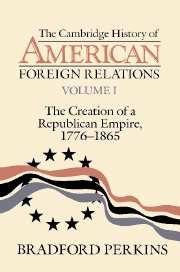Book contents
- Frontmatter
- 1 The Canvas and the Prism
- 2 The Birth of American Diplomacy
- 3 The Constitution
- 4 Federalist Diplomacy: Realism and Anglophilia
- 5 Jefferson and Madison: The Diplomacy of Fear and Hope
- 6 To the Monroe Doctrine
- 7 Manifest Destiny
- 8 Britain, Canada, and the United States
- 9 The Republican Empire
- Bibliographic Essay
- Index
- THE CAMBRIDGE HISTORY OF AMERICAN FOREIGN RELATIONS
- References
2 - The Birth of American Diplomacy
Published online by Cambridge University Press: 28 March 2008
- Frontmatter
- 1 The Canvas and the Prism
- 2 The Birth of American Diplomacy
- 3 The Constitution
- 4 Federalist Diplomacy: Realism and Anglophilia
- 5 Jefferson and Madison: The Diplomacy of Fear and Hope
- 6 To the Monroe Doctrine
- 7 Manifest Destiny
- 8 Britain, Canada, and the United States
- 9 The Republican Empire
- Bibliographic Essay
- Index
- THE CAMBRIDGE HISTORY OF AMERICAN FOREIGN RELATIONS
- References
Summary
To the Declaration of Independence
Twenty-five years before the Revolution, no important person dreamed of independence. Few thought of an “American” identity in any political sense. The word itself was more often used in Britain. Even after the affrays at Lexington and Concord in April 1775, most Anglo-Americans refused to face the prospect of a breach with the mother country. As late as the spring of 1776 John Adams wrote to an impatient correspondent, “After all, my friend, I do not wonder that so much reluctance has been shown to the measure of independency. All great changes are irksome to the human mind, especially those which are attended with great and uncertain effects.” Although by this time Adams and others felt independence desirable, even inevitable, they knew that many, even among Adams’s colleagues in the Continental Congress, shrank from that step.
Of course, Americans were proudly aware of their burgeoning growth. From midcentury onward, Benjamin Franklin, the best-known colonial figure, spokesman in London for Pennsylvania and sometimes other colonies, frequently boasted of it. Franklin even talked of an American “empire.” For him, however, this was to be but an increasingly important component of the larger empire centered in London, at least until the American population outstripped that of the metropol as a result of what he called “the American multiplication table.” On the eve of the Revolution, others joined Franklin. For example, Samuel Adams, John’s cousin, wrote in 1774, “It requires but a small portion of the gift of discernment for anyone to foresee, that providence will erect a mighty empire in America.”
- Type
- Chapter
- Information
- The Cambridge History of American Foreign Relations , pp. 17 - 53Publisher: Cambridge University PressPrint publication year: 1993

